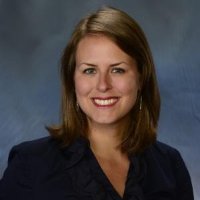JMU Graduate Student Leads Assessment at Auburn University
Graduate SchoolSUMMARY: Dr. Megan Rodgers Good, a graduate of JMU's Assessment and Measurement doctoral program, joined the Provost's Office at Auburn University as the Director of Academic Assessment. In this role, Dr. Good leads assessment initiatives across the university to enhance student learning outcomes.
JMU's A & M Graduate Leads Assessment at Auburn University
 In July 2015, Dr. Megan Rodgers Good, a graduate of JMU’s Assessment and Measurement doctoral program, joined the Provost's Office at Auburn University as the Director of Academic Assessment. In this role, Dr. Good leads assessment initiatives across the university to enhance student learning outcomes. After completing her B.A. in Psychology from Berea College, Megan came to JMU for her master’s studies in psychological sciences and rounded out her education with a Ph.D. in Assessment and Measurement.
In July 2015, Dr. Megan Rodgers Good, a graduate of JMU’s Assessment and Measurement doctoral program, joined the Provost's Office at Auburn University as the Director of Academic Assessment. In this role, Dr. Good leads assessment initiatives across the university to enhance student learning outcomes. After completing her B.A. in Psychology from Berea College, Megan came to JMU for her master’s studies in psychological sciences and rounded out her education with a Ph.D. in Assessment and Measurement.
When asked to describe her experience at JMU with one word, Megan chose “fulfilling.” She explained how it allowed her “to develop into a professional and to be part of a larger community.” She also noted one benefit of staying at JMU for both her master’s and doctoral programs was the varied opportunities to build partnerships across the university, developing confidence in her skills and abilities along with her professional identity. Her education and experiences at JMU prepared her with clear goals for the future.
Megan spent her time at JMU exploring how classes, research projects, and university centers make a difference in the lives and learning outcomes of students, faculty, and staff. From her participation on research teams as a master’s student in the Psychological Sciences program to her work as a graduate assistant in the Center for Faculty Innovation, Megan pursued research projects that lend insight into how to evaluate a program’s effectiveness and learning impact.
With her eyes to the future, Megan worked to build a model that “closes the gap” between program assessment and educators’ use of the results. Megan credits JMU’s unique culture of collaboration for enabling her work with advisor Dr. Keston Fulcher as they built a research program she hopes will result in a national model for using assessment results.
Working at JMU’s Center for Faculty Innovation (CFI) played an important role in helping Megan develop an understanding of how educators make sense of assessment results, laying a strong foundation for her current work at Auburn University. Dr. Cara Meixner, Assistant Director of the CFI and Assistant Professor of Graduate Psychology, described Megan as “a rare professional who has created a dual career niche in the assessment and faculty development communities.”
Megan also participated in several leadership opportunities that equipped her for the leadership role she now has at Auburn. For example, as a member of a research team in the Psychological Sciences, Megan had the opportunity to take on team leadership roles under the direction of Dr. Michael Stoloff. Megan’s role of supervisor and mentor to teams of undergraduate students in conducting original research encouraged some students to stay on the project for as many as three semesters. As a graduate student, Megan consistently demonstrated a commitment to mentoring undergraduates in the classroom, in research teams, and on thesis projects.
Given her leadership in graduate and undergraduate research teams as well as her varied experiences across campus in program assessment, it is not surprising that Megan was invited to participate as the graduate student representative on the Madison Futures Committee. As a member of the academic subcommittee, she contributed to vital conversations about the academic direction of the university. Megan’s eyes lit up as she described her work on this committee: “It was a really meaningful experience. It felt like we were making a difference.”
Now at Auburn University, Megan continues to make a difference by leading the way in program assessment and improved faculty engagement in assessment activities. Her time at JMU gave her the skills and background to blend the technical aspects of assessment with the practical need for faculty involvement. She described her vision for assessment at Auburn this way, “I think it's easy for folks to conceptualize assessment as a check box. However, I hope to work with programs to help them re-conceptualize assessment as a critical tool that can help them tell their learning success stories. Assessment is most useful when it is synced with the teaching and learning questions faculty want to explore.”

